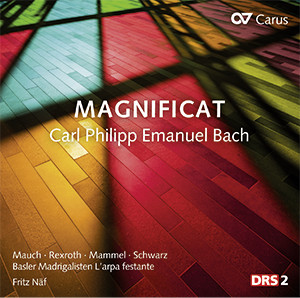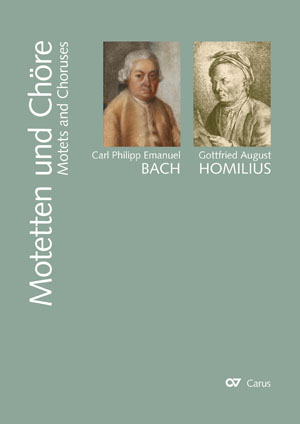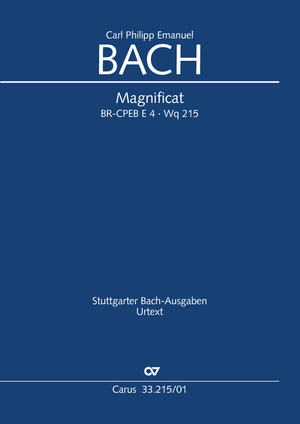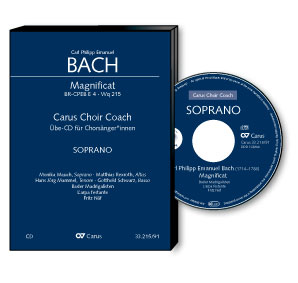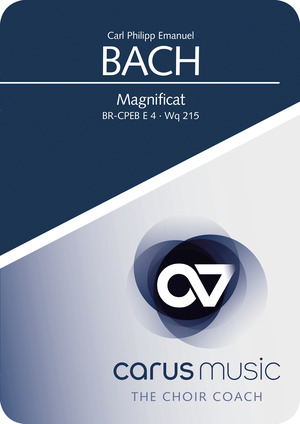Magnificat. Die Himmel erzählen die Ehre Gottes
Long out of print, now finally available again: world premiere recordings of the Magnificat (early Leipzig version) as well as the festive music Die Himmel erzählen die Ehre Gottes by C. P. E. Bach. A rousing and convincing interpretation by the Basel Madrigalists, L'arpa festante and renowned soloists under the direction of Fritz Näf.
Throughout his life, C. P. E. Bach esteemed his Magnificat as one of his most important works. Here it is presented in the rarely heard early Leipzig version from 1749, with which the son wanted to recommend himself as a potential successor to his father in the office of Kantor at St. Thomas's Church. It fulfils all the criteria that the aesthetics of the time demanded of a large-scale sacred composition: grandeur, dignity, polyphonic and concertante choral movements, sensitive and pathetic arias, and a grand concluding double fugue. The festive music Die Himmel erzählen die Ehre Gottes, on the other hand, was written during Bach's later period as music director in Hamburg.
Contents
-
Composer
Carl Philipp Emanuel Bach
| 1714-1788Carl Philipp Emanuel Bach (1714–1788) was an extremely prolific composer who enjoyed a high reputation during his lifetime with the result that his music became known far and wide. The early works were influenced by the Berlin School. In his later works, however, this composer developed a thoroughly individual style, independent of contemporary fashions, which is to be found especially in the sacred vocal works written during his years as Director of Music in Hamburg (1768–1788). Personal details
-
Preface writer
Christine Blanken
-
Ensemble
L'arpa festante Barockorchester
-
Ensemble
Basler Madrigalisten
Founded by Fritz Näf, the Basler Madrigalisten (Basel Madrigalists) sing in the most diverse formations, as soloists and as a small vocal ensemble. Their large repertoire extends from the early Renaissance to the modern period. Their main emphasis is on the preparation and (first) performance of contemporary works and the revival of works from the 15th to 18th centuries. The Basler Madrigalisten have participated in the world’s leading music festivals. Concert tours have taken the choir to nearly every European country, to Russia, the USA, Lebanon and the Far East. Their recordings have received various awards. They have repeatedly gained the sponsor’s award of the Ernst von Siemens musical foundation, and in 1998 they were given the sponsor’s prize of the European Economy. The Basler Madrigalisten are supported by the cantons of the city and district of Basel, the Artephila Foundation and other foundations. Personal details
-
Conductor
Fritz Näf
| 1943Fritz Näf studied solo singing at the Musikhochschule in Zurich and Freiburg/Breisgau and attended master courses given by Jenny Tourel and Ernst Haefliger. As a tenor he appeared in concerts in many parts of Europe, while continuing his studies as a choral and orchestral conductor. Between 1976 and 1986 he taught solo and ensemble singing at the Schola Cantorum Basiliensis, where he founded the Basle Madrigalists in 1978. Between 1986 and 2000 first he was director of the Winterthur Music School and Conservatory, and subsequently rector of the newly established Hochschule for Music and Theater in Zurich. Since December 2000 Fritz Näf has been full-time artistic director of the Swiss Chamber Choir (founded in 1997) and the Basle Madrigalists. He also continues to appear as a guest conductor with various choirs and orchestras. Personal details
-
Soloist - soprano
Monika Mauch
The soprano Monika Mauch studied singing initially with Richard Wistreich at the Institute of Early Music at the Musikhochschule Trossingen. She continued her training by studying for a year with Jill Feldman in Paris. Since the beginning of her singing career she has focused primarily on projects in the field of early music. She has worked with such leading ensembles as the Ricercar Ensemble, Taverner Consort, Red Byrd, the Hilliard Ensemble, L’arpa festante (Munich), the Ensemble Daedalus (Geneva), CordArte Ensemble (Cologne), and Montreal Baroque. Monika Mauch’s vocal achievements are documented on numerous radio and CD recordings. Her recordings for the Altbachische Archiv and the B minor Mass with Cantus Coelln and her “Morimur” CD with the Hilliard Ensemble have attracted especial attention. As a concert singer Monika Mauch works on a regular basis with conductors such as Roland Wilson, Manfred Cordes, René Jacobs and Philippe Herreweghe. Personal details
-
Soloist - alto
Matthias Rexroth
Matthias Rexroth studied in Karlsruhe and at the Schola Cantorum Basiliensis. He is the only countertenor to have won both the Francesco Viñas International Singing Competition in Barcelona and the International Hans Gabor Belvedere Singing Competition in Vienna. He made his operatic debut in Stuttgart in Purcell’s King Arthur. Engagements have included the title roles in Admeto at the Handel Festival in Halle, Giulio Cesare at the Oslo Opera, Der geduldige Sokrates under René Jacobs in Berlin and at the Innsbruck Festival of Early Music and in Ezio at the Düsseldorfer Hofmusik. In concert, Rexroth has performed under Harnoncourt, Muti, Luisi, Luisotti and Rilling and in 2000 as soloist in the worldwide TV and radio broadcast of the B Minor Mass with the Gewandhaus Orchestra, Leipzig. Personal details
-
Soloist - tenor
Hans Jörg Mammel
-
Soloist - bass
Gotthold Schwarz
Gotthold Schwarz received his first musical training at the Dresden Kirchenmusikschule and at the Hochschule für Musik Felix Mendelssohn Bartholdy in Leipzig. This bass studied singing with Gerda Schriever and conducting with Max Pommer and Hans-Joachim Rotzsch. He appears regularly throughout Europe with such celebrated artists as Frieder Bernius, Peter Schreier and Philippe Herreweghe. In additoin to his extensive concert activity, some of it in the USA, he has given courses in the interpretation of Bach’s works. Numerous CD and radio productions document his wide repertoire, which along with concert and opera singing includes song recitals featuring literature ranging from the baroque era to the present day. Personal details
Reviews
Alle Ausführenden wissen under der Leitung von Fritz Näf mit dieser mitreissende Interpretation zu überzeugen.
Musik & Liturgie, 4/2022
Frequent questions about this work
 There are no questions and answers available so far or you were unable to find an answer to your specific question about this work? Then click here and send your specific questions to our Customer Services!
There are no questions and answers available so far or you were unable to find an answer to your specific question about this work? Then click here and send your specific questions to our Customer Services!


